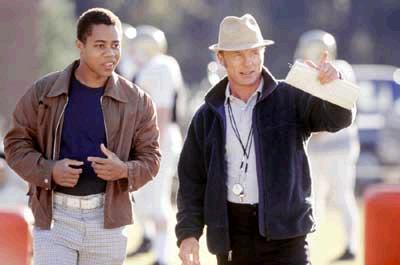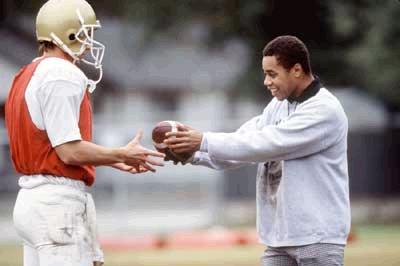

It is no stretch to say that Cuba Gooding Jr. has made some bizarre career choices as of late. Instead of acting, he is turning his happy, manic personality into a caricature, playing similar characters in mediocre to lame comedies (The Fighting Temptations, Boat Trip). With Radio, he once again gives himself a chance to prove that he can act, and he does a good job here. However, Radio suffers from being one of those many movies that take a disabled person and show how wonderful the world is and how everybody can learn something from said person. Radio is a nice, inoffensive film, but is so manipulative in how it wants to squeeze emotion from the audience that it actually becomes something of a turn off, which is kind of sad given the subject.
James Robert Kennedy, or "Radio," (Gooding) is an actual figure that is still a fixture at a small South Carolina High School. He spent his days pushing around a shopping cart and repairing antique radios. He did this every day until the people at Hanna High School began noticing. First, the football team, being teenage boys, locked him in a shed and terrified him. Their coach, Harold Jones (Ed Harris, Masked and Anonymous, The Hours) Jones is horrified at what they boys did to Radio, and decides to do something about it. He engages Radio, and has him help out with the team, and begins to draw the reclusive young man out of his shell. Soon, Radio, a seeming mute at the beginning of the film, is cheering on the team and blossoming under the attention and care of Jones and his players.
Surprisingly, Mike Rich's (The Rookie, Finding Forrester) script keeps its focus on the paternal relationship between Jones and Radio, and eschews the typical trappings of a sports film. Yes, football is a big part of Radio, but the outcome of the film doesn't hinge on winning the big game. Jones is not a perfect father. Football came first, much to the disappointment of his wife (Debra Winger, Big Bad Love, Forget Paris) and daughter (Sarah Drew). Now, he is facing a choice between football and Radio. By focusing on the two, Rich and director Michael Tollin (Summer Catch, Hank Aaron: Chasing the Dream) ground the movie, keeping things simple. They soon falter by making things simplistic.
Radio needs some sort of conflict, both to keep the film interesting and to drive home its mushy point, and it comes in the form of Johnny Clay (Riley Smith, Eight Legged Freaks, Full Ride) and his father Frank (Chris Mulkey, Slow Burn, Requiem for Murder), who seem to be the only two people to find some problem with Radio. It's personal, but they try to throw out all sorts of reasons that have varying degrees of plausibility. They believe that he is a distraction, that the school isn't equipped to deal with a mentally retarded person, and various other things that just show they dislike Radio. But how can anybody dislike him? He does what he can to help others, and has a never-ending passion for all things football.
All the elements for a good movie are here, it's just the execution that is bad. Harris and Gooding's performances complement each other well, and again, it is good to see Gooding turn the histrionics down and concentrate on doing something meaningful. It just seems that Radio has some utopian ideal of small town America that, while appealing, seems a tad to convenient, even knowing that it is based on actual events. One could argue that by simplifying the story so much and reaching for audience tears Tollin is doing a disservice to Radio's accomplishments. Radio just manages to keep an even keel, not descending fully into schmaltz, but never quite stirring real emotions.